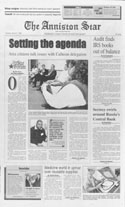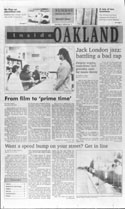Spring 1999
What’s Happening in Pew Center Projects

Anniston, AL
The Anniston Star
The first fruits of The Anniston Star’s Civic Mapping Project became visible to readers March 2, the day the Alabama Legislature began its annual session. Instead of devoting its front page to the same old lobbyists and lawmakers, The Star featured ideas gathered from a forum of community opinion leaders who met with the area’s legislative delegation.
Less than a week later, The Star began a three-part series on two communities that have taken charge of their educational destiny by passing property tax increases to pay for new elementary school buildings. The topics covered in these community profiles were generated by neighborhood opinion leaders who met with Star editors and reporters in planning for the series.
As part of its mapping project, the paper has compiled a master list of such community sources to call on to generate discussion groups and as a resource for reporters looking for comments on breaking news stories. The project is also helping bring in material for The Star’s new Community Page, designed to bring the paper closer to its readers.

Berkeley, CA
Partners: University of California-Berkeley, Oakland Post, KALX-FM
Residents of Oakland are seeing – and hearing – a new kind of coverage of their community through the “Inside Oakland” project. Students at Berkeley’s Graduate School of Journalism have produced two special sections, called “Inside Oakland,” tucked into the Oakland Post. Four more are planned. They’ve also begun regular weekly broadcasts on KALX-FM. And they’re building an “Inside Oakland” web site.
All the stories are written, edited and laid out by students in Bill Drummond’s first year class “Covering a Community.” Students were assigned geographic beats – one for each of the city’s seven councilman districts. They’ve dug up stories such as the surprising entertainment renaissance in a formerly blighted area and a shortfall in money for traffic control in residential neighborhoods.Students recently met with a focus group of 10 readers to discuss what issues the community would like to see covered. As a result, future sections will examine community policing and quality of life issues for elderly in the community.
Tampa, FL
Partners: The Weekly Planet, Speak Up Tampa Bay, University of South Florida, University of Tampa
The partnership expects to launch in April its “wire service” of community news in the Tampa Bay area. Weekly Planet editor Ben Eason says they’ve received tips from about 80 neighborhood associations that they’ll synthesize into a half a dozen news stories. He’ll fax those stories to major newspaper, television and radio newsrooms in the area in the hopes that they’ll assign a reporter to cover one or more of them.
The first group of stories includes one focusing on neighborhood concerns about a change in ownership of a small, local airport. Another examines coal dust fall-out in a neighborhood near a Tampa electric plant.
Journalism students at two local universities will write the stories for the alternative paper, the Weekly Planet, and broadcast students will produce TV stories about them for a monthly Neighborhood News Hour on the public access cable station. Eason says the hope is to get the stories in the major media, to amplify the concerns of the neighborhood groups.
Springfield, VA
NewsChannel 8
The station began its “Target Transportation” project with a 1,000-person telephone survey that found that traffic is the number-one problem faced by people in the metro Washington, D.C., area. The poll also tested commuter attitudes toward major highway construction projects, “road rage” and the tactics regional governments can use to reduce traffic congestion.
The survey was used to kick off an ongoing series of stories and transportation vignettes aired three times a week on the all-news station. It also served as the foundation for a two-and-a-half-hour, live, prime-time broadcast in February in which more than 100 citizens, experts and elected officials at town meetings in Maryland, Virginia and the District of Columbia were electronically linked together to discuss transportation problems and potential solutions.

Elmira, NY
Partners: Elmira Star-Gazette, The Radio Group
When character education expert Louis Martinez arrived in Elmira at the end of March, the community was well-prepared for his two-day workshop, thanks to a three-part series that ran in the Star-Gazette on the last three Sundays of the month. “Kids & Character 2000,” included the results of a Pew-funded survey of 1,000 students and 450 adults on what character traits they considered most important for people to have and how best to instill those traits. Five local stations in the Sabre Radio Group alerted the community that the poll was coming. Editors noted some interesting gender and age differences in the responses.
“Kids and Character 2000” also looked at local efforts at teaching character development, as well as programs in three other towns in western New York. Editor David Kubissa says the series was intended to educate the community on the issue so it could make the most of Martinez’s visit. Martinez will return in the summer for training sessions with local leaders.
Savannah, GA
Savannah Morning News
The newspaper expects to start running a bi-monthly series in May about the impact of the region’s growing elderly population on taxes, services and lifestyles. The Morning News “seniors team” has held focus groups on issues ranging from demographics to nursing homes to impact on extended families. The team is also in the process of developing the first of two surveys on senior issues.
In addition to ongoing focus groups, the team will follow each segment of the series with the creation of task forces to address gaps in community services and other issues for seniors and their families.
Bronx, NY
Partners: BronxNet, The Bronx Journal
The community-access cable channel, BronxNet, has begun purchasing equipment for its “Community Journalism Center,” a large open set from which to broadcast “town square” programs on issues of importance to the borough’s multi-ethnic community. Using funds from the Pew Center and others, set donations from CBS News and local businesses and equipment purchased through a special agreement with Panasonic, BronxNet anticipates having the Center up and running by mid-summer. In the meantime, it continues broadcasting community discussion and debate from its studio, including a recent call-in show with former Mayor David Dinkins on the police killing of an unarmed African immigrant in the Bronx and an electronic town meeting with Borough President Fernando Ferrer on the State of the Bronx.
Pew Center funds are also helping The Bronx Journal, a tabloid published by the Lehman College Multi-Lingual Journalism Program, add a new section just for children. Six Bronx school districts now use the Journal in the classroom, so Professor Patricio Lerzundi says the tabloid decided to expand its children’s page into a full section, called “The Children’s Journal.”
Minneapolis, MN
Partners: Internews Interactive, KTCA-TV
The Minneapolis public television station’s “Citizens’ Forum” got off to a post-election start with two public forums where citizens got a chance to question newly elected governor Jesse Ventura, using video conferencing equipment in different parts of the state. In January, citizens in Bemidji and Mankato, as well as Minneapolis, talked to the governor about the state budget surplus. In February, citizens in Duluth and Windom joined those in Minneapolis to discuss education with Ventura.
“This has been a spectacular addition to our work here,” says Bill Hanley, KTCA vice president for news. “Minnesota is unusual in that it’s a big state with only one major metropolitan area. Videoconferencing helps us connect citizens from all over the state.”
Hanley says the station is negotiating with Ventura’s office to make forums with the governor regular monthly events. In the meantime, “Citizens’ Forum” will broadcast statewide discussions about the Y2K problem and the farm crisis.

Seattle, WA
Seattle Times, KCTS-TV, KUOW-FM
The Front Porch Forum is hosting informal citizen focus groups to talk about the status of community leadership. While the region is rich in leadership development efforts, life-long activists of color note that, in their communities, it has largely been left up to chance. So far, all agree that if any region has the potential to challenge the leadership capacities of all its people, it is the Puget Sound region. The predominantly white Seattle area has chosen a black mayor, county executive and schools superintendent and elected the mainland’s first Asian American governor in the past five years. One of the key issues to be explored is how the community can build on this foundation.

Binghamton, NY
Partners: WSKG, Press & Sun-Bulletin
The partners have begun holding a series of five public hearings, each focused on an end-of-life issue: death, the curative culture of medicine, how different cultures view death differently, proxy decision makers and public attitudes toward death. Just before each forum, the Press & Sun-Bulletin is running feature stories to provide readers with information about the topic.
Additional information will be provided through the WSKG web site and at local libraries. WSKG’s Juan Martinez says the partners hope to educate citizens in the 19-county area around Binghamton. “If they are thinking about these things,” he says, “they can plan before they’re in a crisis.”
Martinez says the partners have received additional funding to make “Care and Consequences” a three-year project.
Muncie, IN
Partners: Star Press, WLBC-FM, Local access cable TV
As Indiana legislators meet to consider tax reform and the state budget, they have a better understanding of where their constituents stand on those issues. The Muncie Star Press has sent every member of the General Assembly a book, called “Hoosiers Talk Taxes,” based on polls and citizen forums sponsored by the paper and WLBC-FM with funds from the Pew Center.
The book is the culmination of a year-long project to inject citizen voices into the statewide tax reform debate. The project included education sessions for both reporters and citizens and a public forum in which citizens discussed tax policy with tax experts and high-ranking state legislators.
Star Press coverage of the forum and other tax reform issues ran under the logo “Tax Reform: Finding a Balance.” The Star Press examination of the state tax system found, among other quirks, that some for-profit businesses are granted tax exemptions if they compete with government-run services, such as cemeteries.
